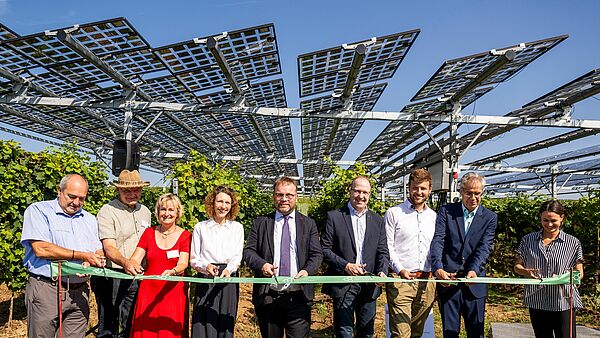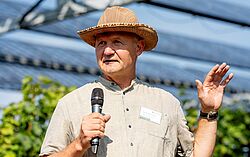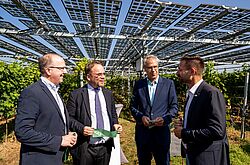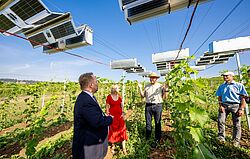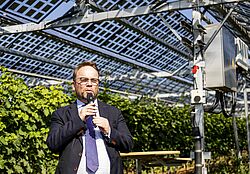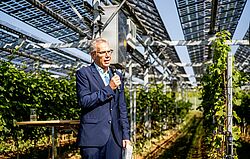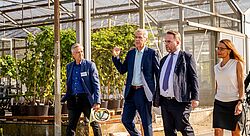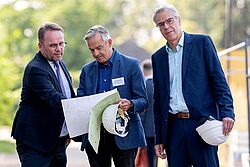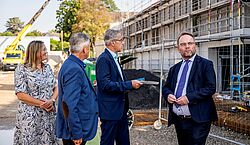Agrivoltaics Facility Delivers Initial Results and Germany’s First Voltaic Wine
Green energy above, white Riesling below; that's the university's VitiVoltaic agrivoltaic research facility in a nutshell. The VitiVoltaic system is a complex installation of automatically controlled photovoltaic modules positioned over grapevines that is intended to test the dual usage of agricultural land for both wine production and solar power generation. The facility and the VitiVoltaic project also provide an important national and international research platform for exchanging ideas with winegrowers on the wide range of challenges facing the future of viticulture in the context of climate change and biodiversity. The Munich-based company AgriPV-Solutions supported Hochschule Geisenheim University in the design, implementation, and installation of the system.
The system went into operation last fall and delivered data for a complete developmental cycle for the first time this year. A first vintage of the wine produced from this research vineyard – the first voltaic wine in Germany – is now also available, as are the first findings from the past year. Among other things, the findings show that there was a slight delay to the ripening process, counteracting the accelerated rate of ripening that has resulted from climate change.
The official inauguration of VitiVoltaic marks the start of a period of intensive research work from which Geisenheim scientists hope to gain many more insights. In the process, Geisenheim’s researchers will remain in close dialog with academic partners from various countries around the world, including Portugal, France, the United States, and Australia. In addition, the VitiVoltaic system is also an essential starting point for further developments in real-world practice. The existing facility has already been used to create a prototype for another innovative system, the VitiCULT-PVmobil, a mobile system for young grapevines developed in collaboration with the Fraunhofer Institute for Solar Energy Systems ISE and the solar energy and structural engineers sbp sonne.
The development and operation of the VitiVoltaic research platform, as well as the acquisition of state-of-the-art machines, such as an autonomous weeding robot, will be funded by the Hessian Ministry of Higher Education, Research and the Arts until 2025, with a total of around €800,000 coming from the European Regional Development Fund (ERDF). A further €300,000 for accompanying scientific research is being provided by the Hessian Ministry of Agriculture.
Comments on the Official Visit and Inauguration of the VitiVoltaic Facility
“Hochschule Geisenheim University offers an impressive spectrum of degree paths closely linked to real-world practice and is advancing research into the important challenges of the future. Within its various subject areas – ranging from wine and beverages to horticulture, food products, and landscape architecture – Hochschule Geisenheim, as one of Hesse’s universities, has an influence that extends beyond our state and past our national borders. The VitiVoltaic facility is an impressive example of this. I was already paying very close attention to agrivoltaics as a member of parliament, and, as such, it has brought me great pleasure today to learn more about the research platform and to officially inaugurate the facility,” says Timon Gremmels, Hesse’s Minister of Higher Education, Research and the Arts, summarizing his impression of his first official visit to Hochschule Geisenheim University.
“The new agrivoltaic facility in Geisenheim is an important new building block for research at Hochschule Geisenheim University and is also a good example of how the university contributes to solving future challenges in agriculture and viticulture through practical projects and concrete findings. It was therefore important to us to help fund the project accordingly. I would like to thank Hochschule Geisenheim University and all those involved for their dedicated research and for facilitating the transfer of knowledge into practice, and I wish them continued success in their work,” states Ingmar Jung, Hesse's Minister for the Environment, Climate Protection, Agriculture and Consumer Protection.
“We would like to warmly thank Minister Timon Gremmels for his interest in our university. During his visit, we were especially pleased that Mr. Gremmels engaged in a detailed discussion about our scientific work and the opportunities and challenges of establishing and expanding international research platforms, with the VitiVoltaic facility serving as an example. Special thanks also go to Ingmar Jung, the Minister for Agriculture and the Environment, for his substantial support during the construction of our facility and in other matters,” comments Professor Hans Reine Schultz, president of Hochschule Geisenheim University.
“Thanks to funding from the Hessian Ministry of Higher Education, Research and the Arts, Hochschule Geisenheim University has been able to establish a perfect platform for researching and testing future solutions for managing the effects of climate change in viticulture with the VitiVoltaic system. In the future, our research will focus on changes in the microclimate and its impact on the health of the grapes, the physiology of grapevines, new plant protection strategies, as well as new technical applications, such as the utilization of battery-powered, autonomous tracked vehicles,” explains Professor Manfred Stoll, head of the Department of General and Organic Viticulture at Hochschule Geisenheim University.
“Another important aspect of the research activities surrounding the VitiVoltaic project is the discussion of important framework conditions and peripheral elements for the sustainable implementation of such systems. This includes, for example, developing ways to increase their societal acceptance and their rapid integration into practice,” adds Professor Claudia Kammann, head of the Department of Applied Ecology.
“The agrivoltaic facility in Geisenheim is the first system in Germany to be planned and installed over grapevines in a vineyard. We are both proud and grateful that we were able to realize this project together with Hochschule Geisenheim University and the state of Hesse,” comments Thomas Franke, the managing director of AgriPV-Solutions.
Further Information
More information on Hochschule Geisenheim University's agrivoltaics projects is available here.
RTL Hessen TV segment (in German; starts at 4:30, available until September 13): https://plus.rtl.de/video-tv/shows/rtl-hessen-898116/2024-9-1012005/episode-176-sendung-vom-06092024-986778

